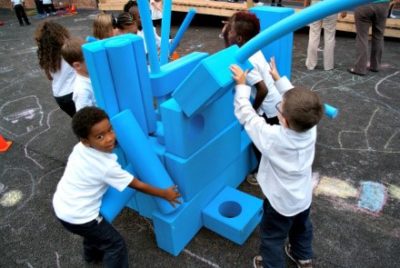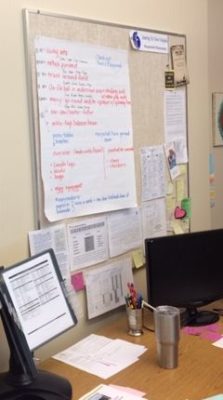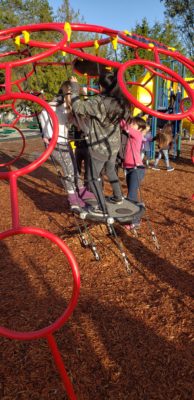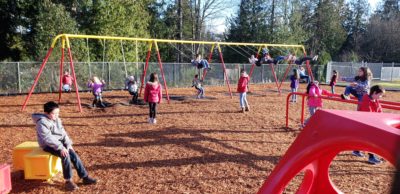A few years ago I dragged my husband to a playground in Illinois near my grandparents’ house. I was eager to show him my favorite piece of playground equipment, a unique contraption that spun around like a merry-go-round. It had bench seats you could sit or stand on. There were bars connecting the seating arrangement at the bottom to the armature at the top, and there were swivels at the top and bottom of each connecting bar. On those hot summer days we could run around and get the system rotating, then we could rock it to make it swing back and forth, all at the same time. It was glorious!
After some exploring, I finally brought my husband to the right spot. All we found was a worn circle in the grass.
Horrified, I set off to find someone in charge. I finally found someone who could answer my question. I described the piece of equipment and said, “I don’t know what you’d call it.”
The man said, “Our lawyers called it a liability.”
I’ve been through multiple playground renovations at public schools. Every time we ripped out equipment pieces that were deemed unsafe. In their place we installed increasingly bland structures.
I remember earlier deletions from the playground and how the principal at the time explained there had been a broken arm. That’s all it took to make items disappear—to make them unavailable for everyone.
I should tell you another story. When I was a toddler, my grandmother shopped for a couple of ottomans for me to climb on. Before she made the purchase, she asked the salesman if they would be safe for a two-year-old.
He said, “Lady, I don’t know from safe. One nephew of mine was walking on a two-by-four on the driveway, fell off, and broke his arm. Another nephew rode his tricycle down the stairs to the concrete floor of the basement and walked away without a scratch. I can’t say what’s safe!”
(I have to admit, I grew up in the era of “let them get hurt—that’ll teach them not to do it again.” I didn’t see a bicycle helmet until I was in college!)
Over the years I’ve watched increasingly safe equipment make recess more boring and less of an outlet for our high-energy kids, giving them little room to run, few things to climb, and nothing to lift. The motto for the Olympics is “Higher, Faster, Stronger.” It seems like the motto for playgrounds became “Stay lower, Go slower, Take your turn.”
Here was my lament—We keep making things safer and safer so our children never got hurt, so they never experience pain. They end up with no existential association of risk with physical danger. Then they grow up and go out for extreme sports! By protecting our children in a layer of bubble wrap until they turn 18, ironically, we make them less prepared to make considered choices as adults.
Meanwhile, as our playgrounds became less and less appealing to children, the number of office referrals for poor behavior during recess steadily rose. At one point the solution that was proposed in multiple states was nothing short of draconian—no recesses at all.
Over the years some backlash arose against the sea of bland. The Adventure Playground movement, which began in Europe after WWII, spread to Washington neighborhoods. Mercer Island has their own Adventure Playground where “in eight years … they’ve only had a few nails in shoes and one broken arm.”
U.S. playground design … [has] long prioritized safety over adventure.
Once our school started imagining what a new playground might look like, I got involved immediately.
At the very least, I argued, an elementary school needs a track around the perimeter of the playground so kids can run laps or compete in foot races. (My grandfather was born in 1904. That’s all the boys did for recess at his school. They ran foot races. Every day. Every recess. He did really well in track at college!)
Faster!
I wanted things kids could push or pull or lift. Can you imagine having really heavy disks kids could push over the tarmac to play tic-tac-toe or checkers? Or giant Lincoln Logs made of 4x4s? Or why can’t the really little kids build with big, loose parts such as Imagination Playground blocks?

Stronger!
And I added that there had to be stuff for kids to climb on. I know, if kids are even a foot off the ground, they can fall and get hurt, but climbing is a physical need for a lot of children. We must find a way to accommodate that need. I’d rather having them climbing on things during recess than during class time!
Higher!
At a class meeting my students added their input. They wanted a dome with rope nets for climbing. They wanted a spinning toy. They wanted a Gaga Ball Pit.
They wanted swings.
“Hold on,” I said. “Swings got removed out years ago because of liability issues. So did all the merry-go-rounds. I’m all for brainstorming, but we do have to be realistic.” (Sigh.)
Nevertheless, I carefully wrote down each idea and conveyed the list to our playground committee. The poster wish list hung in our principal’s office for the rest of the year as we worked on grants and fundraising.
I have to admit, my expectations were low. I’m delighted to say I was wrong!
We got the track.
The spinning toy.
The dome with rope nets.
The Gaga Ball Pit.



We even got the swings!

(I never thought I’d see swings at a public school ever again!)
The whole school is thrilled with the change in office referral stats. There have been almost none since the new playground was installed.
If your district says it’s not possible to have this type of equipment at your school, you want to go to work on changing some people’s minds.
One of my over-arching goals in school is to have fun. It’s absolutely fabulous to see kids having a whole lot more fun out at recess.
